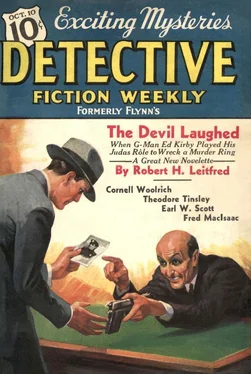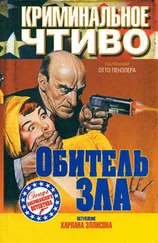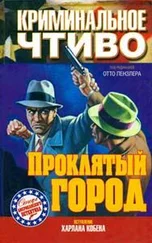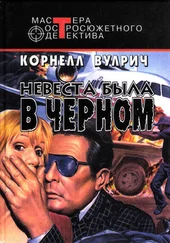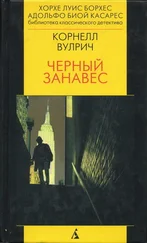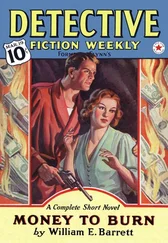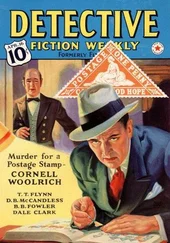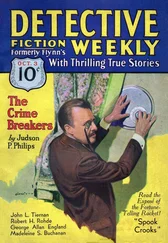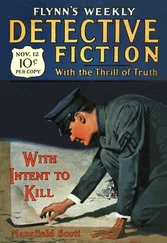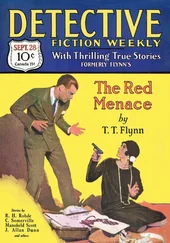Корнелл Вулрич - Detective Fiction Weekly. Vol. 50, No. 5, October 10, 1936
Здесь есть возможность читать онлайн «Корнелл Вулрич - Detective Fiction Weekly. Vol. 50, No. 5, October 10, 1936» весь текст электронной книги совершенно бесплатно (целиком полную версию без сокращений). В некоторых случаях можно слушать аудио, скачать через торрент в формате fb2 и присутствует краткое содержание. Город: New York, Год выпуска: 1936, Издательство: The Red Star News Company, Жанр: Детектив, на английском языке. Описание произведения, (предисловие) а так же отзывы посетителей доступны на портале библиотеки ЛибКат.
- Название:Detective Fiction Weekly. Vol. 50, No. 5, October 10, 1936
- Автор:
- Издательство:The Red Star News Company
- Жанр:
- Год:1936
- Город:New York
- ISBN:нет данных
- Рейтинг книги:4 / 5. Голосов: 1
-
Избранное:Добавить в избранное
- Отзывы:
-
Ваша оценка:
- 80
- 1
- 2
- 3
- 4
- 5
Detective Fiction Weekly. Vol. 50, No. 5, October 10, 1936: краткое содержание, описание и аннотация
Предлагаем к чтению аннотацию, описание, краткое содержание или предисловие (зависит от того, что написал сам автор книги «Detective Fiction Weekly. Vol. 50, No. 5, October 10, 1936»). Если вы не нашли необходимую информацию о книге — напишите в комментариях, мы постараемся отыскать её.
Detective Fiction Weekly. Vol. 50, No. 5, October 10, 1936 — читать онлайн бесплатно полную книгу (весь текст) целиком
Ниже представлен текст книги, разбитый по страницам. Система сохранения места последней прочитанной страницы, позволяет с удобством читать онлайн бесплатно книгу «Detective Fiction Weekly. Vol. 50, No. 5, October 10, 1936», без необходимости каждый раз заново искать на чём Вы остановились. Поставьте закладку, и сможете в любой момент перейти на страницу, на которой закончили чтение.
Интервал:
Закладка:
San Francisco lay below them, a tapestry of winking lights. Around the bend slumbered the newly-developed suburb, bristling with sleek, modernist bungalows. Here the Louws had made their home.
As Warren Louw sighted his drive-way he pressed down the accelerator in joyful anticipation of being home again. In the next instant the ear swerved crazily, skinned a tree on the left side of the road. The headlights, stabbing through the night, had picked out an inert mass lying directly in the path of the speeding car and to avoid striking it Louw had been forced to twist his wheel sharply. Mrs. Louw screamed.
He laughed nervously. “Sorry, dear. For a minute I thought it was a woman.”
“Heavens, what a start you gave me!”
“Stupid of me, darling. Probably just some sold rags or newspapers or something.” He shifted and backed on to the road.
As he was gathering momentum Mrs. Louw clutched his arm.
“Warren, wait! I saw it lying there, too. I’ve got the strangest feeling that it wasn’t any bundle of rags or newspapers or anything else, but a—”
“Why, gosh, darling, if you think that we’ll go back and look.”
They sat stiffly apart now, nervous and apprehensive. Louw let the car slide backwards, while his wife craned her neck out the window, straining her eyes towards the spot where they had seen that still, disordered mass.
“It’s here!” she cried.
They jumped out and hurried to the spot. Staring down, their hands groped instinctively for each other.
“Oh,” was all Mrs. Louw could say. “Oh!”
“Poor old thing,” Louw murmured.
They were looking at the body of an old woman. The moon had slid from behind a cloud and splashed a wide beam on the hatless, white head. She wore a red sweater and a pink house-dress. She was trail and slight, and the parchment white old face, blank in death, held gentility and breeding.
“She’s... she’s been ran over,” gasped Mrs. Louw.
Louw braced her with his arms. “Don’t look, dear. Go back to the car.”
But neither of them could avert their eyes from that limp, crushed body. The wheels of a heavy car had rolled across the abdomen. The woman’s cheekbone — she lay on her hack — was bruised.
“I’d like to get the guy who did this,” Louw muttered between clenched teeth. “Another one of those hit and run skunks.”
“We’d better telephone the hospital,” said Mrs. Louw.
“Yeah, and the police. I’m not going to touch her. There may be some clue, some way of tracing whoever bit her.”
A few minutes later Louw was barking excitedly into a telephone: “Park Emergency Hospital? Listen, this is Mr. Warren Louw, at 129 Kenwood Way. There’s an old woman lying about a hundred yards down the road. She’s been hit by a car. Yeah, dead. Better send somebody quick.”
Presently the shrill whine of an ambulance siren sounded along the road. The Louws heard the ambulance grind to a stop and ran out to direct it. “This way,” Louw shouted.
Dr. James Clary knelt by the old woman’s head. “Sure,” he muttered, “it’s a hit-and-run case. Looks like she was taking a little stroll, wandered out in the middle of the road and a car, sweeping around the bend, ran clean over her. Hasn’t been dead very long. Body still warm.” It was then shortly after ten.
Mrs. Louw shuddered. “Do you think they’ll ever find the driver?”
“Dunno, lady. He’s probably three counties away by now. That’s a job for the police.”
“I wonder who she was.”
“Well, this might help.” He indicated a diamond ring on the right hand, and, removing it, read aloud the inscription, “ ‘ From Joe to Jessie.’ Yes, that’s certainly something.”
“You know,” put in Louw, who had been studying the dead woman’s face fixedly, “I think she lived near us. Seems to me I’ve seen her walking in the evenings.”
“So? Well, the police will be glad to know about it. All we can do now—” He nodded to one of the white-coated internes, standing at his elbow.
The latter said: “To the morgue.”
II
Captain of detectives, Charles Dullea, sharp-nosed and square-jawed, one of the slickest, coolest hounds of the law in the history of the San Francisco Police Department, was fiddling with a dictaphone record when Deputy Coroner Jane Walsh entered his office.
“Oh, Captain,” she hailed him, “another hit-and-run case down at the morgue.”
“Yes,” he said, without looking up from the black disk, “it’s getting to be a habit. Who is it this time?”
“That’s just it. No identity. Doc Clary picked her up out Kenwood Way. She’s an old lady, looks as though she had background and refinement. A car ran smack over her middle.”
Dullea let the disk roll from his thick, knotted fingers. He stared wide-eyed at the lady coroner. “Did you say Kenwood Way?”
“Sure, why not?”
“Why not! Why not, indeed! It’s... it’s fantastic! It just couldn’t happen, that’s all!”
He made strange, rumbling noises in his throat. Deputy Walsh eyed him questioningly, but he had recovered. He was once more impassive, cool. “Come on,” he said, “I want to see this woman.”
But by the time they reached the city morgue the mystery of the dead woman’s identity had been solved. A city boiler inspector, John J. Kane, having recognized her photograph in a late edition of the newspapers, had come forward.
“I know who she was,” he told the morgue officials. “Her name was Mrs. Jessie Scott Hughes.”
He repeated this information to Dullea when that troubled sleuth emerged from an examination of the body.
“What do you know about her?” Dullea asked.
“Well, not an awful lot. I just knew her in a casual sort of way. She’s a widow, lives alone in a little house not far from where they found her body, three doors down from the people who found her, as a matter of fact — the Warren Louws. She had plenty of dough.”
“That tallies with the ring I saw on her finger — ‘From Joe to Jessie.’ I suppose ‘Joe’ was her husband.”
“I suppose so.”
“I can set your mind at ease on that point, gentlemen. He was!” This came from a tall, elegantly dressed man who had suddenly appeared in the corridor. His voice was musical and beautifully modulated.
Dullea wheeled around. “Frank Egan!” he exclaimed. “What are you doing here?”
“Oh, didn’t you know? She... she was an old friend.” He turned away, moved.
“That’s right,” Kane piped. “Mrs. Hughes was a client of Mr. Egan here.”
“Is that true, Egan?”
“Precisely true. She was not only a client, she was a dear, dear, friend. I’ve known Jessie since — let me, see — since the ’quake of 1906. I was driving a Wells Fargo Express wagon then. You remember how the whole city was fleeing madly from their homes. I saw this girl standing bewildered in, the street with a small lad. I picked them up and drove them to the girl’s sister.
“Ever since I’ve been in private law practice I’ve Handled her legal and financial affairs. I... I think she would have wanted me to take charge of the funeral arrangements.”
“Why, certainly, Egan, certainly, no objections there.”
“And now, Captain, if you’ll excuse me — this thing has shaken me horribly. If there’s anything, anything I can do to find the man who struck Jessie down please let me know.”
“I’ll do that, Egan.” Dullea watched the man’s broad back disappear down the corridor.
The presence of Frank J. Egan at the morgue had given the affair an atmosphere of prime importance and authority. The sympathetic-faced, keen-eyed man was one of the most beloved characters in San. Francisco public life. By, unswerving honesty and hard work he had risen from a policeman’s beat to become a brilliant attorney and now, public defender.
Читать дальшеИнтервал:
Закладка:
Похожие книги на «Detective Fiction Weekly. Vol. 50, No. 5, October 10, 1936»
Представляем Вашему вниманию похожие книги на «Detective Fiction Weekly. Vol. 50, No. 5, October 10, 1936» списком для выбора. Мы отобрали схожую по названию и смыслу литературу в надежде предоставить читателям больше вариантов отыскать новые, интересные, ещё непрочитанные произведения.
Обсуждение, отзывы о книге «Detective Fiction Weekly. Vol. 50, No. 5, October 10, 1936» и просто собственные мнения читателей. Оставьте ваши комментарии, напишите, что Вы думаете о произведении, его смысле или главных героях. Укажите что конкретно понравилось, а что нет, и почему Вы так считаете.
